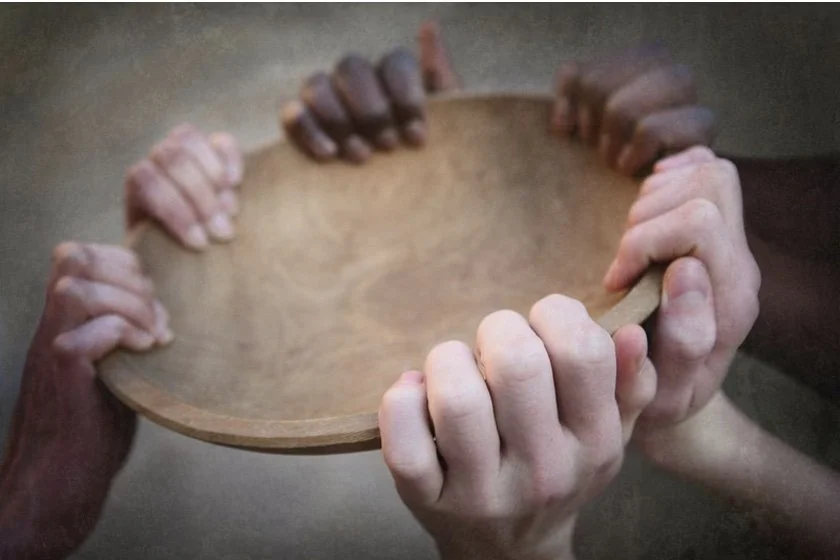Letter of James 3:13-4:3, 7-8a and Mark 9:30-37
One August morning, I was having breakfast out of doors in front of a café on Strong Avenue in Northampton. It’s a lovely place in the summer, when they close off the street, put up big planters: giant, living bouquets of seasonal plants and flowers that adorn the street, for people who have the time and money to enjoy the weather, the surroundings, and the good food offered by the restaurants on the street. It’s also on the edge of the downtown area, where the workers at the gift shops and clothiers are just making their way to work. And the unhoused are coming out of shelters, store doorways, tents, and finding their place on Main Street, or beginning their routes on Main Street, side streets, alleyways, and parking lots to ask for money. One man was making his way down Strong Avenue. I had finished my bagel and coffee and was staring out, listening to a podcast. Our eyes met and he asked me for one or two dollars because he had to get to Boston and he hadn’t eaten in 3 days. That was my in: “Can I buy you some breakfast?” Do you have a dollar, he asked. “I can buy you breakfast.” Okay. Egg and bacon on white bread and black coffee. I go into the café and order. It takes a while. I come out with his breakfast and someone who had heard our exchange explained that he had walked away and was down the street in the parking lot. “Hey! I have your breakfast!” I don’t want it! “But, I got it for you.” I said I wanted money! “You also said that you hadn’t eaten in 3 days!” You can have it. Ugh. I brought it home and gave the coffee to Sam (it’s good coffee!) and we shared the sandwich the next day.
Here’s the dilemma. Was he really going to Boston? Had he eaten in 3 days? Did he want the money to buy drugs? I don’t know. Some might say that it’s none of my business. Some might say that if I gave him money, I should know why I’m giving him money.
Here’s another position: I actually had the money. I had withdrawn 50-$1 bills a few days before, for the express purpose of giving money to people in the street asking for money. So, why didn’t I just give him $2 like he asked? Because he said he was hungry. I employed the Jesus loophole: “Feed the hungry,” Jesus said. Okay! I’ll feed the hungry. And I won’t have to worry about giving him money that he might use in a way that I don’t agree with. That was my quick, almost unconscious, decision. Based on scripture. Or, so I told myself. But, then there are other snappy sayings as well that could have influenced my actions, like, “you can lead a horse to water, but you can’t make him drink.” And, also, “don’t throw good money after bad.” And then, there’s the one that I’ve heard and seen more often than any of these words of advice: “Just ignore him.”
And through all of the above decisions, and the words of wisdom that may or may not have influenced them, where’s the wisdom from above that is “first pure, then peaceable, gentle, willing to yield, full of mercy and good fruits, without a trace of partiality or hypocrisy” that James mentions in chapter 3 verse 17 of his letter? Does the wisdom lie in feeding him because he said he was hungry? Would wisdom have been in the possible decision of giving him the $2 that he asked for, even if I think he might use it to buy drugs? Maybe? I don’t know. And then there’s another question to ponder in retrospect of this encounter: who am I to judge him and what he’ll use the money for?
Jesus says in Mark, chapter 9, verse 35, “Whoever wants to be first must be last of all and servant of all." Am I putting my wisdom, privilege and station above him? Does it give me the right to decide for him whether or not he gets fed or gets money? If so, then I am the servant to all, according to Jesus. If I put myself first, if I put myself above another person, then Jesus says that I am that person’s servant. The person in need: I am responsible to fill his needs.
These people on the streets, these people with their hands out, are people who are laying themselves open to any who can support them, to support them. Each, like a child. Jesus says, in Mark Chapter 9, verse 37, “Whoever welcomes one such child in my name welcomes me, and whoever welcomes me welcomes not me but the one who sent me.” We are all children of God. And each of us are divine in God’s eyes. With that idea, with that instruction from Jesus, we are to act as we interpret those words of Jesus.
I spoke to my sister about this. You know, the sister who hands out sandwiches, water, socks and hats to men in the streets of Holyoke. We had a long, thoughtful conversation about it, and her bottom line is, “do as your heart tells you.” And since we’re all churchy people, my hope is that what our hearts tells us reflects in some way what Jesus tells us to do. There’s no one answer to all the questions posed today. Except, perhaps, reflect on the words of Jesus Christ, take those words into our hearts, and respond accordingly. With love. With purity. With peace. With gentleness. With a will to yield. With mercy. With good fruits. And without a trace of partiality or hypocrisy. Amen.
